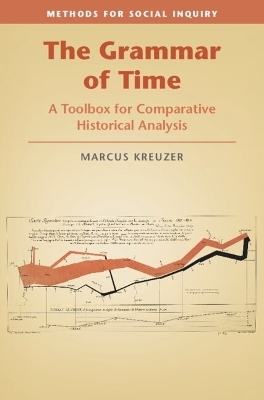
The Grammar of Time
Cambridge University Press (Verlag)
978-1-108-48378-0 (ISBN)
Kreuzer offers guidance to scholars looking to comparative historical analysis (CHA) for the tools to analyze macro-historical questions. Like history, CHA uses the past to formulate research questions, describe social transformations, and generate inductive insights. Like social science, CHA compares those patterns to explicate generalizable and testable theories. It operates in two different worlds—one constantly changing and full of cultural particularities and another static and full of orderly uniformities. CHA draws attention to the ontological constructions of these worlds; how scholars background historical and geographic particularities to create a social reality orderly enough for theorizing, while others foreground those particularities to re-complexify it to generate new inductive insights. CHA engages in ontological triage, dialogue between exploration and confirmation, and conversation in how to translate test results into genuine answers. This book is supplemented by online materials including introductory videos, diagnostic quizzes, advanced exercises, and annotated bibliographies.
Marcus Kreuzer is Professor of Political Science Department, Villanova University. His research builds a bridge between the worlds of history and social science methodology. His earlier research focused on the 19th century origins of modern democracy and the role party systems played in the consolidation of interwar and post-communist democracies. His subsequent work on comparative historical methodology has won several best paper awards from American Political Science Association. He also regularly teaches comparative historical analysis at various methods schools.
Introduction: how to study a disorderly world in an orderly fashion; Section I. The Temporal foundations of comparative historical analysis; 1. Historical thinking: stop talking about testing for once!; 2. Varieties of historical time: history is not a dummy variable; 3. Physical time: capturing the rhythms of history; Section II. How to use history to describe patterns; 4. A primer on the origins of electoral systems; 5. Eventful analysis: using dates to explore patterns of (dis-) continuities; 6. Longue Durée analysis: looking for serial patterns; 7. Macro-causal analysis: physical time and the temporal construction of theories; Section III. What about causality?; 8. situating comparative historical analysis: heterodox yet still systematic; 9. Historical explanations: making sense of continuities and discontinuities; 10. Causal process tracing: making testing symmetric; Conclusion: different origins and shared complementarities.
| Erscheinungsdatum | 16.05.2023 |
|---|---|
| Reihe/Serie | Methods for Social Inquiry |
| Zusatzinfo | Worked examples or Exercises |
| Verlagsort | Cambridge |
| Sprache | englisch |
| Maße | 158 x 235 mm |
| Gewicht | 470 g |
| Themenwelt | Geisteswissenschaften ► Geschichte ► Geschichtstheorie / Historik |
| Informatik ► Datenbanken ► Data Warehouse / Data Mining | |
| Sozialwissenschaften ► Soziologie ► Empirische Sozialforschung | |
| ISBN-10 | 1-108-48378-X / 110848378X |
| ISBN-13 | 978-1-108-48378-0 / 9781108483780 |
| Zustand | Neuware |
| Informationen gemäß Produktsicherheitsverordnung (GPSR) | |
| Haben Sie eine Frage zum Produkt? |
aus dem Bereich


